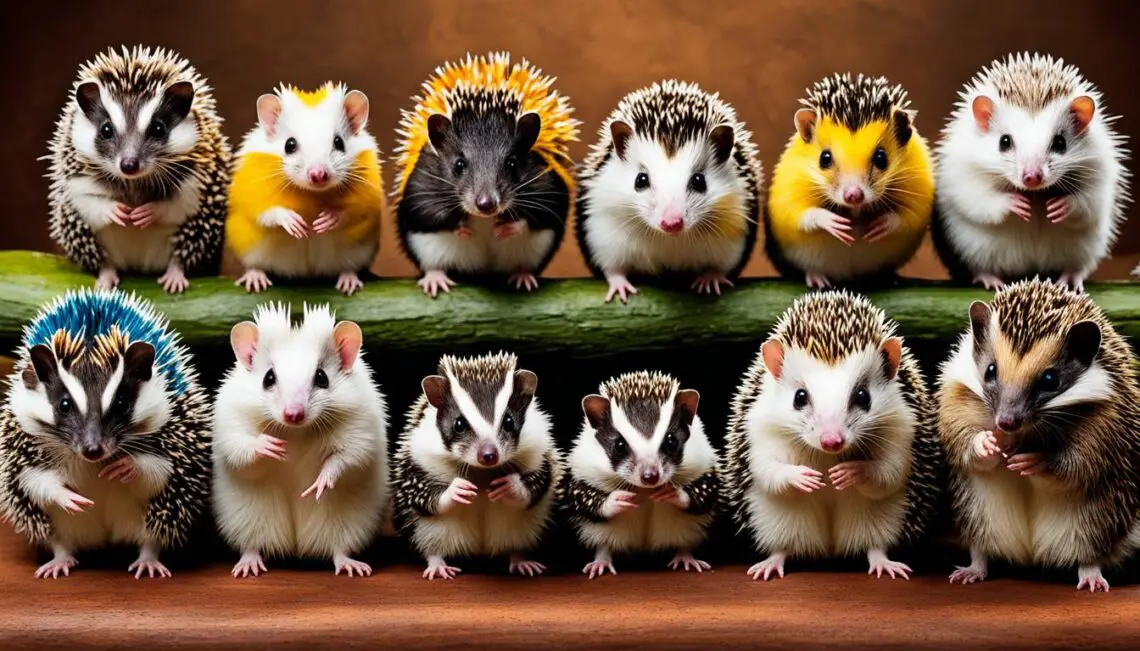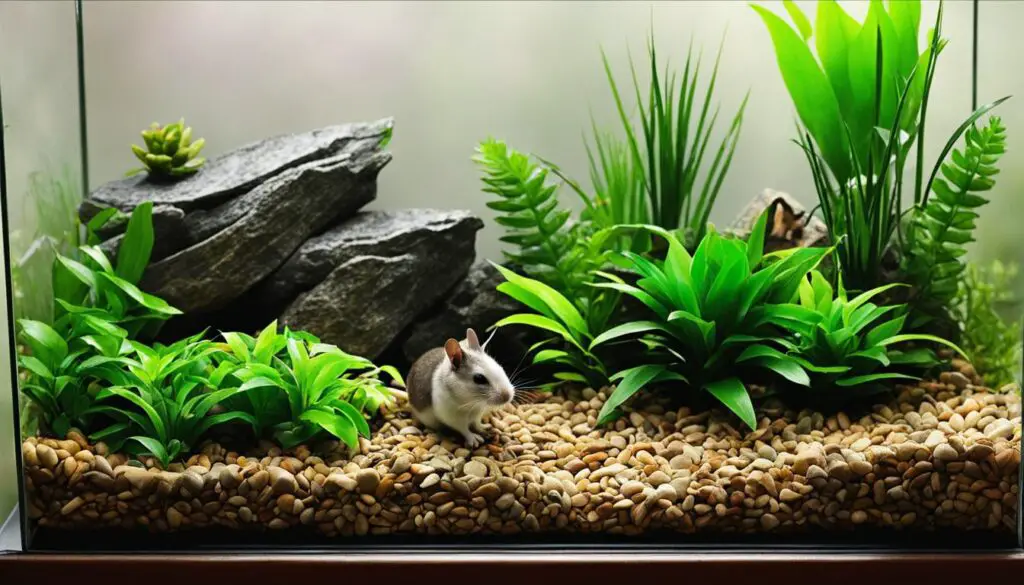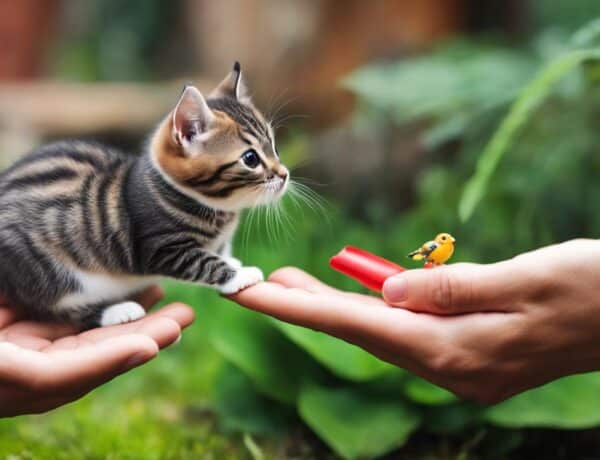When it comes to pets, many people think of cats and dogs as the typical companions. However, there is a fascinating world of exotic small pets beyond the traditional. Reptiles, birds, and small mammals offer unique behaviors that can offer a different and fulfilling pet ownership experience.
But before navigating the world of exotic small pets, it’s important to understand their specific needs and care requirements. Researching their diet, habitat, temperature, socialization, and veterinary care is essential to ensure you can provide a suitable environment for their well-being.
Key Takeaways
- Exotic small pets, such as reptiles, birds, and small mammals, offer a unique pet ownership experience.
- Thorough research on their specific care requirements is crucial before bringing them into your home.
- Find an experienced veterinarian who specializes in exotic animal care to ensure their health and well-being.
- Create an appropriate environment that mimics their natural habitat for their comfort.
- Understand their specialized nutritional needs and provide a well-balanced diet.
Researching Your Chosen Exotic Pet
Before bringing an exotic pet into your home, it is crucial to conduct thorough research to ensure you are adequately prepared. Each species has unique requirements, including diet, habitat, temperature, humidity, socialization, and veterinary care. By understanding the natural behaviors and needs of the species you are interested in, you can provide the optimal environment and care for your exotic pet.
One important aspect of researching exotic pets is understanding their lifespan, activity level, and potential health issues. This knowledge will guide you in choosing the right pet that aligns with your lifestyle and capabilities. Whether you are considering a reptile, bird, or small mammal, knowing the specific needs of the species will help you make an informed decision.
The Benefits of Researching Exotic Pets:
- Allows you to provide the optimal environment for your pet
- Helps you choose a pet that matches your lifestyle and capabilities
- Prepares you for the unique requirements and challenges of exotic pet ownership
By investing time and effort in researching exotic pets, you are demonstrating a commitment to providing the best possible care for your new companion. Whether you are a first-time exotic pet owner or have prior experience, thorough research is essential to ensure the well-being and happiness of your pet.
“Researching your chosen exotic pet is the foundation for creating a successful and enriching pet-owner relationship.”
| Researching Exotic Pets | Choosing the Right Pet | Unique Requirements |
|---|---|---|
| Species-specific requirements for diet, habitat, temperature, humidity, socialization, and veterinary care | Understanding natural behaviors, lifespan, activity level, potential health issues | Providing the optimal environment, care, and avoiding common pitfalls |
Through careful research and consideration, you can ensure that your chosen exotic pet receives the specialized care it requires. The information you gather will guide you in creating an appropriate environment, selecting the right pet, and meeting their unique needs. Remember, research is key to providing a fulfilling and healthy life for your exotic pet.
Finding an Experienced Veterinarian
Regular veterinary care is crucial for the well-being of any pet, including exotic animals. However, not all veterinarians are experienced in treating exotic pets. It’s important to find a veterinarian who specializes in exotic animal care or has extensive experience with the species you own. They will have the specialized knowledge and resources to provide the best care, conduct routine check-ups, and address any health concerns specific to your exotic pet. Building a good relationship with an experienced veterinarian is essential for the overall health and longevity of your pet.
When searching for an exotic pet veterinarian, consider the following:
- Ask for recommendations from other exotic pet owners or local exotic pet communities.
- Research the veterinarian’s credentials, certifications, and experience with exotic pets.
- Visit the veterinarian’s clinic or facility to ensure it is equipped to handle exotic pets and maintains a clean and safe environment.
- Inquire about the veterinarian’s availability for emergencies and after-hours care.
- Discuss and clarify the costs of veterinary care, including routine check-ups, vaccinations, and any potential specialized treatments.
Remember, finding an experienced veterinarian who understands the unique needs of your exotic pet is crucial for their overall well-being. Establishing a trusting relationship with your veterinarian will provide you with the reassurance that your pet is receiving the veterinary care they require.
Tips for Choosing the Right Exotic Pet Veterinarian:
| Factors to Consider | Description |
|---|---|
| Specialization and Experience | Look for a veterinarian who specializes in exotic animal care or has extensive experience treating the specific species you own. |
| Recommendations | Ask for recommendations from other exotic pet owners or local exotic pet communities to find a trusted veterinarian. |
| Credentials and Certifications | Research the veterinarian’s credentials and certifications to ensure they have the necessary knowledge and qualifications. |
| Facility Inspection | Visit the veterinarian’s clinic or facility to assess its suitability for handling exotic pets and maintaining a safe environment. |
| Emergency Care Availability | Inquire about the veterinarian’s availability for emergencies and after-hours care to ensure your pet can receive prompt attention when needed. |
| Cost of Care | Discuss and clarify the costs associated with veterinary care, including routine check-ups, vaccinations, and specialized treatments. |
Creating an Appropriate Environment
Exotic pets, with their unique needs and behaviors, often require specialized habitats that cater to their specific environmental requirements. Mimicking their natural habitat is crucial for their overall health and well-being. Understanding the environmental needs of exotic pets, such as temperature, lighting, humidity, and substrates, is essential for creating an appropriate habitat that promotes their comfort and happiness.
Each species has distinct environmental requirements that need to be met to ensure their optimal health. For example, reptiles may require a temperature-controlled enclosure with specific lighting to replicate their natural habitat. Some species of rodents need adequate burrowing space for their instinctual behaviors, while certain reptiles thrive with climbing opportunities. By researching and understanding the environmental needs of your exotic pet, you can provide them with a stimulating and enriching habitat that closely mimics their natural surroundings.
When creating an exotic pet habitat, it’s important to consider the following factors:
- Temperature regulation: Exotic pets often have specific temperature requirements to maintain their physiological functions. An enclosure with a temperature gradient enables them to move between warmer and cooler areas, allowing them to regulate their body temperature effectively.
- Proper lighting: Many exotic pets, especially reptiles, rely on specific lighting conditions to support their natural behaviors and physiological processes. Ultraviolet (UV) lighting, for instance, is essential for reptiles’ vitamin D synthesis and overall well-being.
- Humidity control: Some exotic pets, such as amphibians, require specific humidity levels to thrive. Installing misting systems or providing water features can help maintain the necessary humidity in their habitat.
- Substrate selection: Choosing the right substrate for your exotic pet’s habitat is crucial. Different species have different substrate preferences, ranging from sand for desert-dwelling reptiles to soil for burrowing rodents. A suitable substrate promotes natural behaviors and provides a comfortable environment.
Creating an appropriate environment for your exotic pet not only ensures their physical well-being but also helps to reduce stress and enrich their lives. By providing a habitat that closely mimics their natural surroundings, you’re giving them the opportunity to exhibit their natural behaviors and thrive.
Specialized Nutrition
When it comes to caring for exotic pets, understanding their nutritional needs is crucial. These unique creatures often have varied dietary requirements that differ from traditional pets. For example, reptiles like snakes and lizards thrive on a diet of live insects, fruits, and vegetables, while birds need a diverse mix of seeds, pellets, and fresh fruits and vegetables to meet their nutritional needs.
Providing a well-balanced diet is essential for the optimal health of your exotic pet. It’s important to research and understand the specific nutritional requirements of your pet species to ensure they receive the necessary nutrients. Consulting with a veterinarian or exotic pet nutritionist can provide valuable guidance in formulating a diet plan tailored to your pet’s needs.
Creating a varied and nutritionally rich diet for your exotic pet is essential. This helps prevent nutritional deficiencies and promotes overall health and well-being. Always ensure that the diet you provide meets the specific dietary needs of your pet, considering factors such as age, species, and any underlying health conditions.
Additionally, it’s important to monitor your pet’s weight and body condition regularly. Adjusting their diet accordingly, in consultation with a veterinarian, can help maintain a healthy weight and prevent obesity or malnutrition.
Key Points:
- Exotic pets have varied dietary requirements different from traditional pets.
- Reptiles may require live insects, fruits, and vegetables.
- Birds need a mix of seeds, pellets, fruits, and vegetables.
- Consult with a veterinarian or exotic pet nutritionist for guidance.
- Create a varied and nutritionally rich diet for optimal health.
- Monitor your pet’s weight and body condition regularly.
Handling and Socialization
Exotic pets require special handling techniques and socialization to ensure their comfort, safety, and overall well-being. Understanding your pet’s temperament and providing mental stimulation are key factors in creating a positive and enriching environment for them.
Understanding Your Exotic Pet’s Needs
Each exotic pet has unique preferences when it comes to handling and socialization. Some species, such as reptiles and certain small mammals, may prefer minimal interaction and feel stressed or threatened by excessive handling. On the other hand, birds and some small mammals thrive on socializing and mental stimulation.
When handling your exotic pet, always consider their natural behaviors and personal boundaries. Respect their need for personal space and observe their body language for signs of stress or discomfort. This will help build trust and create a positive bond with your pet.
Appropriate Handling Techniques
Proper handling techniques are essential to ensure the safety and well-being of both you and your exotic pet. If you’re unsure about the best way to handle your pet, consult with an experienced exotic veterinarian or a knowledgeable pet care professional.
Here are some general guidelines for handling different types of exotic pets:
- Reptiles: When handling reptiles, always support their body and avoid restraining them excessively. Be aware of their natural defenses, such as biting or tail lashing, and handle them gently to minimize stress.
- Birds: Birds have delicate bones and feathers, so handle them with care. Avoid squeezing or applying pressure to their wings or body. Use perches or your hand to provide stability and support while holding them.
- Small Mammals: Each small mammal has its own handling requirements. Some may enjoy being held and petted, while others may prefer to explore or have limited physical contact. Observe your pet’s behavior and handle them accordingly.
Providing Mental Stimulation
Mental stimulation is as important as physical exercise for exotic pets. It helps prevent boredom, promotes natural behaviors, and enhances their overall well-being. Providing interactive toys, puzzles, and opportunities for exploration can keep your pet mentally stimulated and engaged.
Handling and Socialization Guidelines
| Exotic Pet | Handling Techniques | Socialization Needs |
|---|---|---|
| Reptiles | Support body, avoid excessive restraint, be aware of natural defenses | Minimal handling, focus on environmental enrichment |
| Birds | Handle with care, avoid applying pressure to wings or body | Regular social interaction, opportunities for flight and play |
| Small Mammals | Observe individual preferences, handle gently and appropriately | Varies by species, provide opportunities for exploration and interaction |
By understanding your exotic pet’s needs, following appropriate handling techniques, and providing mental stimulation, you can ensure a happy and healthy life for your unique companion.
Conclusion
Owning an exotic pet can be a unique and rewarding experience, but it is important to remember that it comes with specific responsibilities. It is crucial to thoroughly research the species you are interested in and understand their unique behaviors and needs. By doing so, you can provide a fulfilling and healthy life for your new companion.
A lifelong commitment is required when owning an exotic pet. This includes ongoing education, dedication, and love. It is important to find an experienced exotic veterinarian who can provide specialized care for your pet. Additionally, creating an appropriate environment that mimics their natural habitat and meeting their specialized nutritional needs are key factors in their overall well-being.
Exotic pet ownership is a responsibility that should not be taken lightly. It requires a commitment to lifelong care and providing for all their needs. Before bringing an exotic small pet into your home, ensure that you are fully prepared to meet their responsibilities and give them the care they deserve.
FAQ
What are some unique behaviors of exotic small pets?
Exotic small pets exhibit a wide range of unique behaviors, such as burrowing, climbing, or specific prey capture techniques. Understanding these behaviors is crucial for providing appropriate enrichment and stimulation.
How do I research the exotic pet that is right for me?
To choose the right exotic pet, conduct thorough research on different species, considering factors such as lifespan, activity level, and specific care requirements. This will help ensure that the pet you choose matches your lifestyle and capabilities.
How do I find a veterinarian experienced in exotic pet care?
Finding a veterinarian who specializes in exotic animal care or has extensive experience with the species you own is important. They will have the knowledge and resources to provide the best care, conduct routine check-ups, and address any health concerns specific to your exotic pet.
How can I create an environment that mimics the natural habitat of my exotic pet?
Researching and providing an appropriate environment is crucial for the well-being of exotic pets. This may include temperature-controlled enclosures, proper lighting, humidity regulation, and specific substrates. Mimicking their natural habitat ensures their overall health and well-being.
What are the specialized nutritional needs of exotic pets?
Exotic pets often have dietary requirements that differ from traditional pets. For example, reptiles may require a diet of live insects, fruits, and vegetables, while birds need a diverse mix of seeds, pellets, and fresh fruits and vegetables. Understanding and meeting their specific nutritional needs is essential for their optimal health.
How should I handle and socialize my exotic pet?
Each exotic pet species has different handling requirements and socialization needs. It’s important to understand your pet’s temperament and follow appropriate handling techniques to ensure their comfort and safety. Providing environmental enrichment through toys, puzzles, and interaction will also promote their overall well-being.
What are the responsibilities of owning an exotic pet?
Owning an exotic pet requires ongoing education, dedication, and love. It’s a lifelong commitment that involves providing appropriate care, being aware of legal considerations, and understanding the unique needs of the species. Thorough research and preparation are necessary before bringing an exotic pet into your home.







No Comments